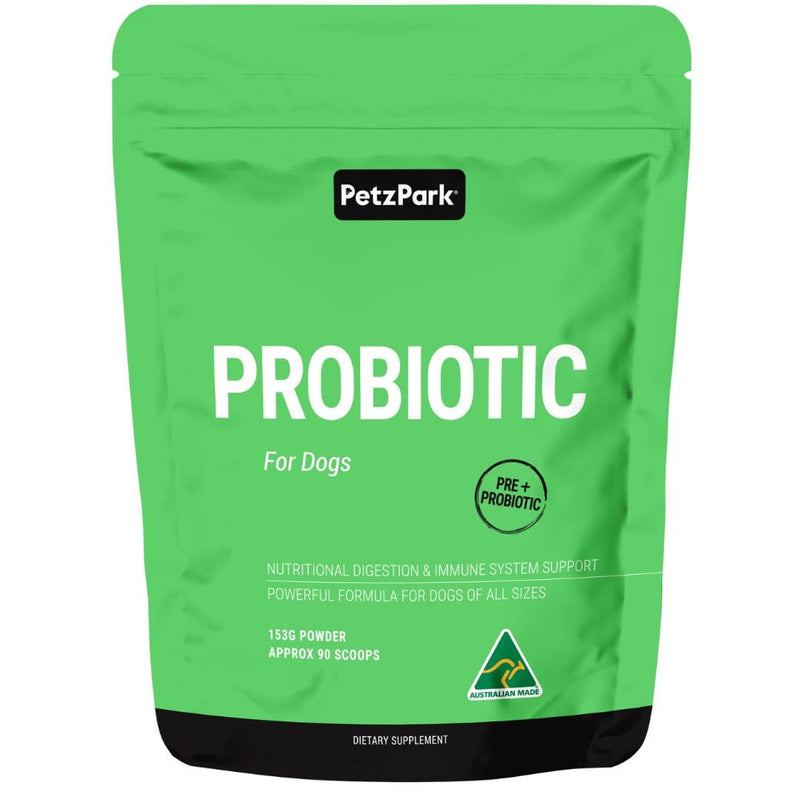
You’ve probably heard that different supplements can help maintain or improve your dog’s health. If you are a responsible dog owner, you would take care of your pet’s health as much as your own. Physical activity, diet, and many other factors affect dogs’ health, and just as for humans, certain dietary supplements and probiotics could support their overall condition and well-being.
What Are Dog Probiotics and Why Should You Consider Them?
Probiotics are microorganisms or good bacteria that are naturally present in dogs’ guts and beneficial for their health. A healthy digestive system is supported by a balanced amount of those good bacteria, which further entails the healthy balance of the whole body and dogs’ immune system.
Probiotics for dogs usually include bacteria that already exist in their guts like:
- Enterococcus faecium
- Lactobacillus acidophilus
- Lactobacillus casei
- Bifidobacterium lactis
- Bifidobacterium breve
Probiotics contribute to dogs’ overall well-being, supporting digestive health, functioning of the immune system, nutrient absorption, and limiting the number of harmful bacteria.
Even if a dog ingests bacteria that is bad for its gut, probiotics can control the acidity of the digestive tract and with the help of fatty acids, make the dog stay healthy. Besides, dogs’ immune system depends very much on gut health which is considered to be a first defense against illnesses.
What Is the Difference Between Probiotics and Prebiotics?
When looking for supplements for your dog, besides probiotics, you may come across prebiotics too. The main difference between these products is the way they affect dogs’ digestive systems.
Unlike probiotics which are live microorganisms, beneficial bacteria, and yeasts that create balance in the gut microbiome, prebiotics are types of fibers that nourish those good bacteria already present in dogs’ guts.
Prebiotics are fibers that can’t be digested by gut enzymes but stay to be fermented by the gut bacteria and provide a favorable environment for them. Because they promote the growth of healthy bacteria and support their activity, prebiotics are also very helpful for keeping your dog’s gut balanced and healthy.
What Are the Benefits of Dog Probiotics?
A solution to all digestive problems
Probiotics are a valuable solution to all digestive problems your dog may experience. They can help with diarrhea, bloating, gas, cramping, bad digestion, or constipation. Besides all this, probiotics support the immune system and protect your pet from other diseases and health problems.
Healthy skin and coat
Probiotics are good for dogs’ overall well-being, but they especially help with maintaining healthy skin and fur. By balancing the skin microbiome, and allowing your pet to absorb enough nutrients, vitamins, and minerals, probiotics make their skin healthier. Probiotics also work against allergies, reduce dry skin and dandruff, and have anti-inflammatory properties.
Restores gut after antibiotics
Antibiotics are important for fighting many diseases, however, they can sometimes do more harm than good if they are not prescribed correctly, or used excessively. When antibiotics eliminate bad bacteria that are causing the illness they also kill those good bacteria that are essential for the balanced functioning of a dog’s gut. In such cases, dog probiotics can replace the beneficial bacteria and balance out the dog’s gut.
Reduce gut-related illnesses
Probiotics generally help digestion and can solve digestive issues, but they also combat immune system imbalance, and digestive problems caused by anxiety or stress. Probiotics can help with yeast infections, irritable bowel syndrome, obesity, parasites, and issues with old age.
What Types of Dog Probiotics Can You Find?
Dog probiotics exist in various forms. Natural probiotics can even be found in some food like yogurts, kefir, or some fermented veggies.
Otherwise, you can find probiotics in:
- some dry dog food
- probiotic chews
- powders
- capsules
When choosing a probiotic for your pet, keep in mind that they should contain live bacteria which should be marked on the packaging. Also, never give your dog probiotics made for humans, as those won’t be good for them.
When Should Dogs Take Probiotics?
Dogs will benefit from taking probiotics whenever they eat something bad, or whenever there is an infection or a digestive problem. Antibiotics can seriously harm a dog’s gut microbiome, so it’s always a good idea to combine antibiotics with gut-restoring probiotics along with their diet.
Changes in a dog’s life or stressful situations can also cause digestive problems in dogs, or shake their immune system. That can also be a time to think of giving your pet some probiotics. Finally, dogs can also take probiotics regularly, for prevention, or simply to maintain their digestive health. Whatever the situation is, it’s good to contact your vet for professional advice and correct prescriptions.
